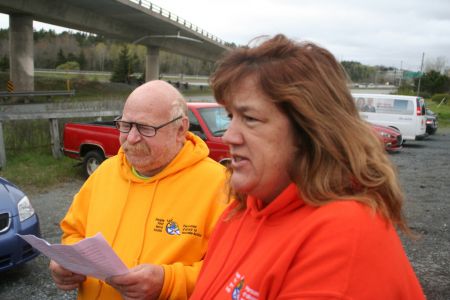K'JIPUKTUK, HALIFAX - The violent death of a resident at the Quest Regional Rehabilitation Centre in Lower Sackville has parents, activists and self advocates worried and saddened.
On May 11th an alleged assault occurred at the institution. An attack by a felllow resident left Gordon James Longphee, a 56-year-old man, in intensive care with critical injuries.
Today it was announced that Longphee has died.
At a hastily called press conference outside of the Quest building Brenda Hardiman, co-founder of Advocating Parents of Nova Scotia (APNS), a support organization for parents of children with intellectual disabilities, called the death of Longphee part of a double tragedy.
"The other tragedy in this devastating situation is that a person could well face criminal charges," Hardiman said. "APNS believes that both the [provincial] Department of Community Services and Quest should shoulder some responsibility for events that take place in their facility."
Hardiman is the mother of Nichele Benn, who currently is a resident of Quest. Benn faces assault charges for attacking a staff member of the institution.
Supporters of Benn argue that she suffers an organic brain disorder that causes her aggressive episodes and that she, and others like her, do not belong in the criminal justice system.
"To think of the senseless death and to think that there could be criminal charges... We want institutions closed and small option homes with proper staffing established," said Hardiman. Small option homes typically accommodate as few as three residents and are located in the community.
"Staff do what they can with the resources they are provided. But there are just too many people living here," said Hardiman.
Hardiman believes that resident-to-resident violence is a much more frequent occurrence than Quest and Community Services are willing to admit.
She wonders why it took Quest four days to call in the police and has little faith in an investigation initiated by Community Services. " That's like the RCMP investigating the RCMP," she said. "I think an independent body needs to come in."
Charlie Lemon is a past president and founding member of the Nova Scotia chapter of People First, a group of self advocates for those who have been labeled as living with intellectual disabilities. Their motto is "Nothing about us without us."
Lemon lived in a large institution for years but now has his own apartment and works at a pizza shop.
"I am very upset about this death," Lemon told reporters. "A large group of people forced to live in institutions against their will, that will cause problems like this."
"People First members believe that people should not be locked away in institutions. They have a right to live in a home, in a community of their choosing," said Lemon.
Cindy Carruthers, Administrative Support Coordinator for People First Nova Scotia agrees.
"Many of our People First members lived in institutions, and they are all very successful out in their own communities," Carruthers says.
"Some receive special supports but they live independently, working or doing volunteer work, having friends, and having what every other Nova Scotian enjoys - choice, equality and the ability to interact with your community."
Lemon, Carruthers and Hardiman all expressed support for a Community Services roadmap that sees large institutions entirely eliminated over the next ten years. But even a proposed moratorium on new intakes by the spring of 2015 is not soon enough for them.
"We want an shut down [of large institutions] and [more appropriate] places for these people established immediately," said Hardiman.
"Parents all fear a phone call similar to the one the families received this week," Hardiman told reporters. " I worry every time I go to bed, especially lately. You think that [your child's] well being would be assured, but it is not."
APNS is organizing protests at all five large institutions operating in Nova Scotia. Check APNS facebook pages for details.
See also:
Community Services Transition Roadmap hits speedbump
Parents argue that their children should not face jail
Rallies throughout Nova Scotia call for end to criminalization
Follow Robert Devet on Twitter @DevetRobert



